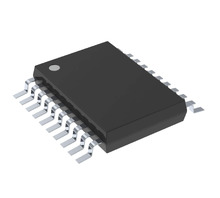Manufacturer Part Number
SN74ABT543ADW
Manufacturer
Texas Instruments
Introduction
The SN74ABT543ADW is a high-speed, non-inverting transceiver belonging to Texas Instruments' 74ABT series. It is designed for asynchronous communication between data buses.
Product Features and Performance
Non-inverting transceiver with 8 data bits per element
Capable of driving heavily loaded outputs with high-current capability
Bidirectional data communication
3-State outputs for bus interfacing
Supports 4.5V to 5.5V supply voltage range
Operational temperature range from -40°C to 85°C
Sustains 32mA output high and 64mA output low current
Product Advantages
Robust high-speed signaling for reliable data transfer
Compatibility with TTL signal levels
Low power consumption and high drive capability
Versatility through bidirectional data flow
Key Technical Parameters
Logic Type: Transceiver, Non-Inverting
Number of Elements: 1
Number of Bits per Element: 8
Output Type: 3-State
Current Output High, Low: 32mA, 64mA
Voltage Supply: 4.5V ~ 5.5V
Operating Temperature: -40°C ~ 85°C
Quality and Safety Features
Manufactured by a reputable semiconductor company
Stringent quality control and testing ensuring device reliability
Compatibility
Compatible with 5V technology systems
Surface mount compatible with 24-SOIC package
Application Areas
Memory buffering and data transmission in computer systems
Signal bridging in telecommunication infrastructure
Industrial electronics with digital logic interfaces
Product Lifecycle
Product Status: Active
Not currently near discontinuation
Supported with ongoing Texas Instruments updates and replacements if necessary
Several Key Reasons to Choose This Product
Reliable data transfer due to high drive strength and minimal propagation delay
Flexibility for use in various logic interface applications
Enhanced data integrity suitable for industrial environments with a wide operating temperature range
Long-term supplier support and product availability from Texas Instruments
Easy integration into existing systems because of industry-standard SOIC packaging





 SN74ABT541BIPWREPTexas Instruments
SN74ABT541BIPWREPTexas Instruments SN74ABT573ADWRTexas InstrumentsIC OCT TRANSP D-TYP LATCH 20SOIC
SN74ABT573ADWRTexas InstrumentsIC OCT TRANSP D-TYP LATCH 20SOIC SN74ABT573ANSTexas InstrumentsTRANSPARENT D-TYPE LATCH, 8-BIT
SN74ABT573ANSTexas InstrumentsTRANSPARENT D-TYPE LATCH, 8-BIT SN74ABT541DWRTexas InstrumentsBUS DRIVER, ABT SERIES, 8-BIT
SN74ABT541DWRTexas InstrumentsBUS DRIVER, ABT SERIES, 8-BIT